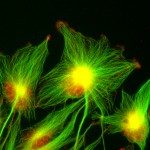Lien vers Pubmed [PMID] – 25664942
Elife 2015;4
The tumor suppressor protein Scribble (SCRIB) plays an evolutionary conserved role in cell polarity. Despite being central for its function, the molecular basis of SCRIB recruitment and stabilization at the cell cortex is poorly understood. Here we show that SCRIB binds directly to the CH1 domain of β spectrins, a molecular scaffold that contributes to the cortical actin cytoskeleton and connects it to the plasma membrane. We have identified a short evolutionary conserved peptide motif named SADH motif (SCRIB ABLIMs DMTN Homology) which is necessary and sufficient to mediate protein interaction with β spectrins. The SADH domains contribute to SCRIB dynamics at the cell cortex and SCRIB polarity function. Furthermore, mutations in SCRIB SADH domains associated with spina bifida and cancer impact the stability of SCRIB at the plasma membrane, suggesting that SADH domain alterations may participate in human pathology.


